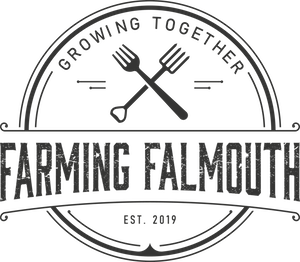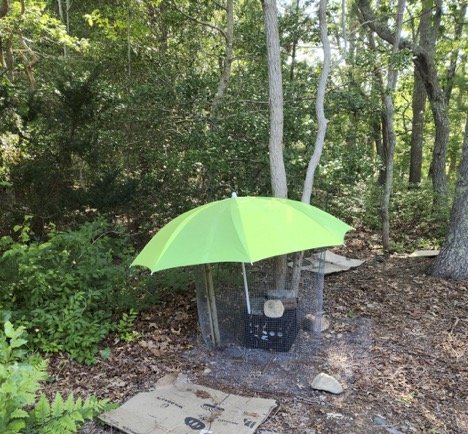Introducing Korean Natural Farming
To greatly improve and increase the vegetables in her garden, Jennifer Bussum of Farming Falmouth is practicing alchemy – the alchemy of Korean Natural Farming. If KNF has doubled the production of a nut farm in Hawaii, why not try it here? This article is just an introduction to KNF. Throughout the year, we’ll put up more details about it on Farming Falmouth’s social media profiles.
Our story begins when Chris Trump (no relation!) and his two brothers inherited their parents’ 750 acre macadamia nut farm on the Big Island of Hawaii. The farm was failing: the trees were dying of a fungal disease, phytophthora, that has no cure. Chris heard about a Korean farmer named Cho Han-kyu or Master Cho, who was concocting potions and powders that he added to his soils and getting extraordinary results. Chris went to Korea, studied under Master Cho for a couple of years, returned to Hawaii and transformed the farm. The trees healed and became bountiful, production doubled, while the farm’s costs remained the same as before. Chris was so impressed by the changes that he began to teach ‘Natural Farming’ in English for world-wide audiences.
Some background: Master Cho is Korean; Korean Natural Farming is not. It has its origins in various local methods used for centuries, but largely displaced by ‘conventional’ farming involving tractors and rows of monoculture crops. Master Cho says he learned his approach mostly from his own experience on his parents’ farm and from working with three Japanese farmers; they learned theirs from a variety of sources. Master Cho’s son is teaching JADAM, new variations different from his father’s. It’s all low cost agriculture so farmers can make their own inputs and amendments without having to rely on expensive, proprietary corporate ones.
Fundamental to all the variants of natural farming is this: Healthy soil nourishes healthy plants. Nature, not synthetic chemicals, provides the best nutrition for healthy soil - a soil full of fungi, bacteria and local plants and animals, both big and very, very small. Together they form an integral, ever-circling web of life.
Some of the basic differences in the KNF approach from the commercial ones using petroleum-based fertilizers:
the use of syrups and inoculates that are made from local fungal mycorrhizae and bacteria
once the potions are made, only tiny amounts are needed and
will be used both as leaf sprays and soil amendments
diversity, diversity, diversity – in plants grown, in potions made and used, in how each plant is fed and tended
the nutrients change according to the life cycle of different plants. What you feed a baby is different from what you feed a teen or an older adult.
Perhaps most unusual, Trump emphasizes that with this sort of farming, the farmer will be able to make a good living.
Like most of us, Jennifer’s own gardening began in a small plot, using organic fertilizers and amendments, but she wasn’t getting the results she was hoping for. Her vegetables were so-so; chipmunks, rabbits and insects ate her produce.
Last January at a Farming Falmouth meeting, board member Kurt Achin told her about an upcoming Chris Trump 6-day workshop in Truro. (Kurt had lived in Korea for several years as well, but he didn’t learn about KNF until he began working at Coonamessett Farm and got hooked.) Jennifer is partly Korean, so for her, everything suddenly felt like a perfect coming together. In April she went to the workshop. As soon as she came home, she started making potions.
So far, there have been triumphs and disasters - the farming way of life. She has tried to make a special fungal fluff in a cedar box of partially cooked rice, collecting mycorrhizae from local forest leaves to put on top, hoping the fungus would form to eat the starches in the rice before bacteria beat them to it.
But chipmunks find cooked rice as delicious as we do. Six times they have ruined wire mesh-covered boxes, digging out the soil beneath them. Now Jennifer is constructing ever sturdier fortifications of increasingly strong wire mesh around the box to withstand the rice marauders, with an elegant green umbrella to keep it all dry.
Note: The job of soil fungi and bacteria is simply(!!!?) to drink sugar sent out from plant roots, use the sugar’s energy to reproduce, and to collect elemental nutrients and send them up into the plants. Both KNF fungi and potions are inoculants of what is already there, but super concentrated and effective: you only need add a tiny amount to the soil, as they are living critters who happily spread and spread once they’ve found a welcoming soil or plant.
This winter Jennifer will be making more amendments and fermented materials, followed by an anti-bacterial Oriental Herbal Nutrient, involving traditional dried Chinese herbs. Come spring, she’ll try them out on the plants in her garden, and we’ll all begin to learn more about how KNF works here in Falmouth.
Written by Molly Bang







